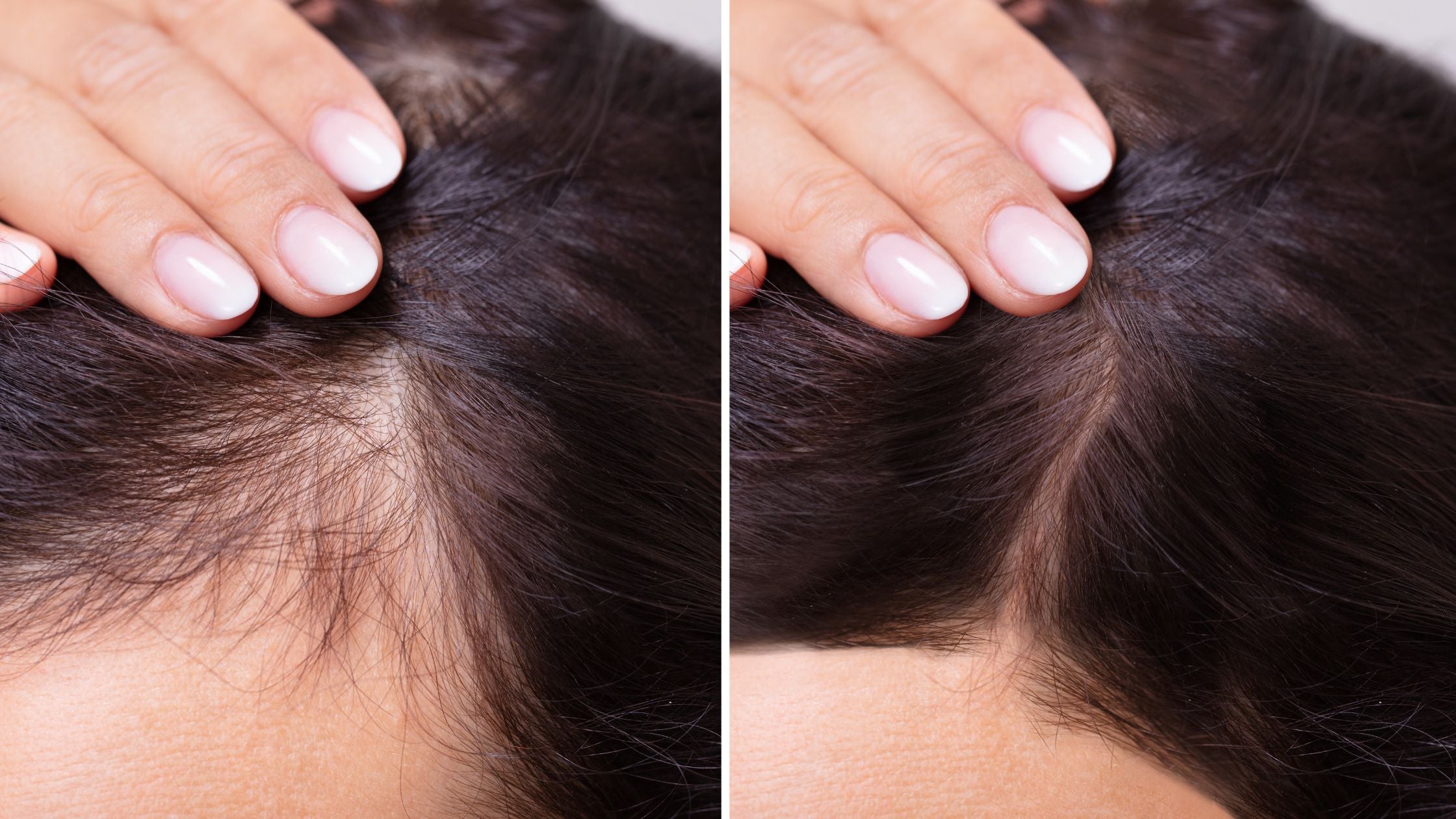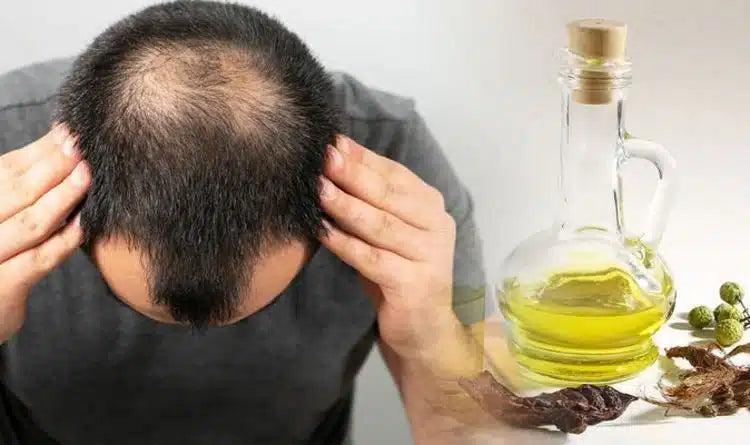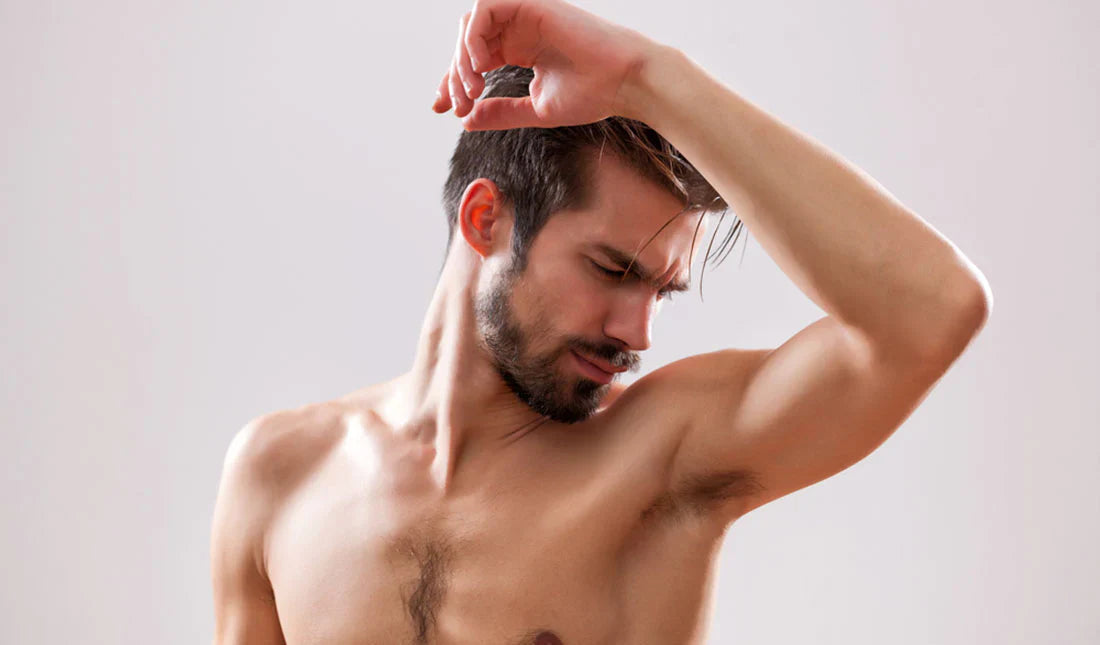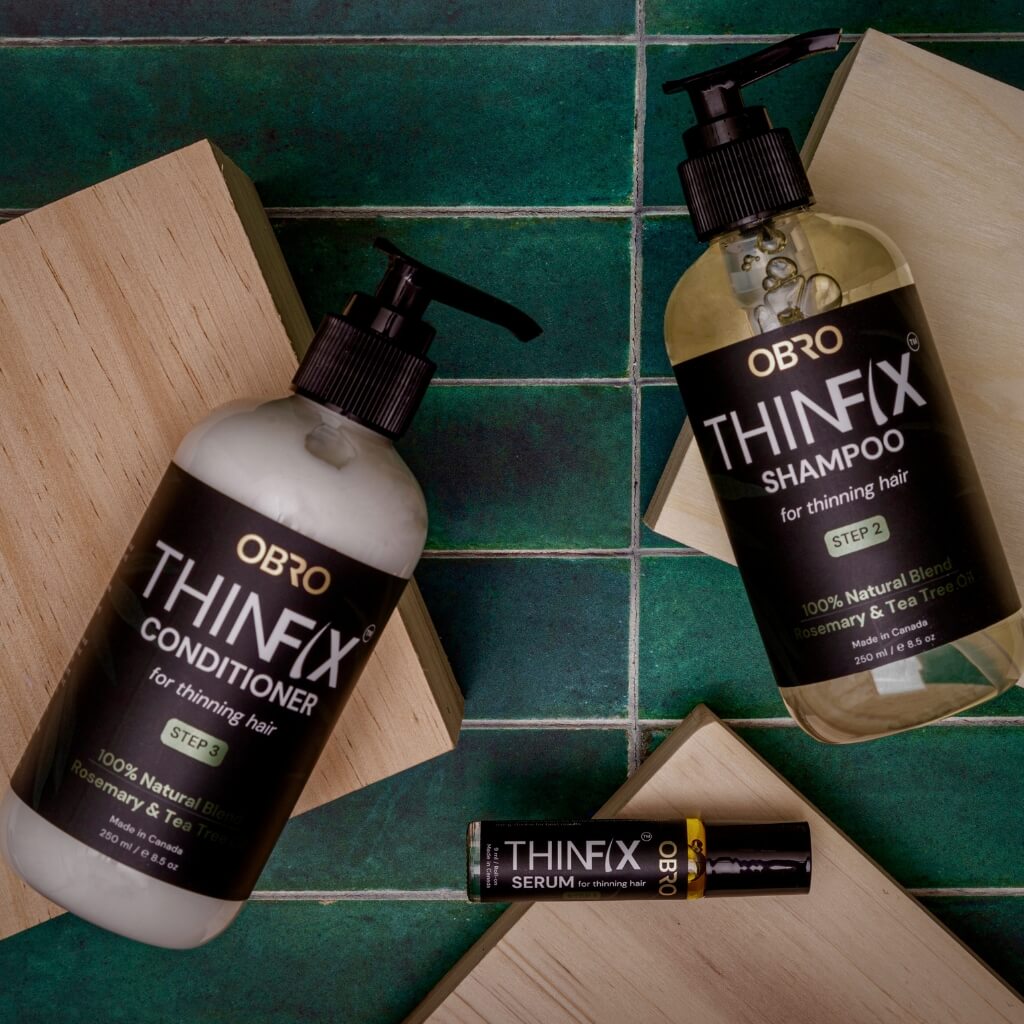Top 10 Natural Remedies to Combat Thinning Hair
One of the primary concerns men face when it comes to grooming is "Male Pattern Baldness," a condition that can be managed with the right approach. Here are some practical strategies to help maintain and potentially improve the health and fullness of your hair.
Some of the stats: It's a common misconception that thinning hair and baldness primarily affect men. In reality, according to the American Academy of Dermatology, over 30 million women in the United States experience hair loss to some degree. Additionally, The American Hair Loss Association reports that by age 35, two-thirds of men will have some noticeable hair loss, and by age 50, about 85% of men will have significant hair thinning. These statistics underscore the prevalence of thinning hair among both men and women, emphasizing the importance of effective and natural remedies.
What we cover in this blog post
- Scalp Massage: This technique can stimulate blood flow to the hair follicles, promoting growth and counteracting the onset of male pattern baldness.
- Coconut Oil Treatments: Coconut oil has the potential to provide nourishment to the hair and may offset hair thinning associated with male pattern baldness.
- Herbal Remedies: Certain herbs, such as ginseng and aloe vera, can be beneficial in addressing hair loss concerns.
- Maintain a Healthy Diet: Consuming a nutritious, balanced diet is vital for hair health and can help in managing hair loss.
- Stress Management: Chronic stress can exacerbate hair loss issues, so it's essential to incorporate stress management strategies into your routine.
- Silk Pillowcases: Sleeping on silk pillowcases can reduce friction on the hair, minimizing breakage and aiding in the management of hair loss.
- Regular Trims: This tip may seem counterintuitive, but regular trims can prevent split ends, promote healthier hair, and give the illusion of fuller hair, countering the typical thinning associated with male pattern baldness.
1) Scalp Massage

Are you concerned about your thinned hair? Perhaps you've heard that massaging your scalp can stimulate hair growth. Not only can a scalp massage feel incredibly relaxing, it can also increase blood flow to the hair follicles and help to nourish and strengthen the hair. Regular scalp massages can also help to remove build-up from styling products or oil, which can congest the hair follicles and contribute to hair thinning. So if you're experiencing hair loss or just need some stress relief, consider giving yourself or scheduling a scalp massage and see if it makes a difference for your locks.
How to Massage Your Scalp for Hair Growth
- Prepare Your Scalp: Before you start the massage, it is crucial to ensure that your scalp is clean and devoid of any product build-up. This step is essential because a clean canvas allows for better absorption of any oils that may be used during the massage and ensures that blood flow is not obstructed by any external factors.
- Choose the Right Oil: Opt for oils that promote hair growth such as rosemary, peppermint, or castor oil. These oils are known for their ability to stimulate blood circulation and nourish the hair follicles, thus promoting hair growth.
- Warm Up the Oil: Warm up a small amount of the chosen oil in your hands. The heat from the oil helps to open up the hair follicles, making them more receptive to the nourishment provided by the oil.
- Apply the Oil to your Scalp: Using your fingertips, apply the oil to your scalp. This step helps ensure that the oil is evenly distributed and reaches the roots of the hair where it's needed most.
- Massage: Begin at the front of your scalp and work your way back using circular motions. Be sure to cover all areas of the scalp. This process increases blood circulation to the hair follicles, which can fuel hair growth.
- Apply Pressure but Don't Rub: Use firm but gentle pressure with the pads of your fingers to avoid damaging your hair follicles. It's important to remember that the aim is to move the skin of the scalp, not to rub the hair itself, as this helps stimulate blood flow more effectively.
- Be Consistent: Consistency is key when it comes to scalp massage. Aim for a 10-minute massage at least three times a week. Regular stimulation of the scalp through massage can have a positive impact on hair thickness and growth over time.
2) Coconut Oil Hair Mask

Thinning hair can be a frustrating issue for many, especially those looking for a quick fix. Enter coconut oil, a natural remedy that has been used for centuries to promote hair growth and add volume. A coconut oil hair mask is a simple yet effective treatment that can help rejuvenate and revitalize your hair.
By deeply nourishing your scalp and hair follicles, coconut oil works to strengthen your strands from the inside out, helping to prevent breakage and promoting healthier, fuller-looking locks. So why not try incorporating a coconut oil hair mask into your hair care routine? With its many benefits and easy application, it just might be the solution you've been looking for to combat thinning hair.
What are the benefits of coconut hair masks?
- Rich in Essential Nutrients: Coconut oil is packed with lauric acid, capric acid, and vitamins E and K, all of which are crucial for hair growth. These nutrients penetrate the hair shaft, nourishing the hair from the inside out and promoting stronger, healthier strands.
- Antimicrobial Properties: The antimicrobial properties of coconut oil can help to combat scalp infections and fungal growth, common culprits of hair loss. By creating a healthier scalp environment, coconut oil paves the way for more effective hair growth.
- Hydrating Effect: Coconut oil acts as a natural moisturizer, preventing dryness and brittleness in hair. By keeping the hair hydrated, it lessens the chances of hair breakage and split ends, both of which can impede hair growth.
- Protein Retention: Coconut oil has a unique ability to help retain protein levels in hair strands. Since hair is primarily made of protein, preserving these levels is critical for maintaining hair strength, preventing hair loss, and promoting growth.
- Natural Conditioner: Not only does coconut oil promote hair growth, but it also doubles as a natural conditioner, leaving your hair silky and shiny. Well-conditioned hair is less prone to damage, which helps in maintaining hair growth.
- Scalp Health: Regularly applying a coconut oil mask can soothe the scalp, reduce inflammation, and minimize dandruff, which can all benefit hair growth. A healthy scalp is the foundation of healthy hair growth.
3) Avoid Washing Too Often
Washing your hair regularly is an essential part of personal hygiene, but did you know that it could lead to hair loss? That's right. Excessive washing can cause damage to your scalp and hair follicles, leading to a pattern hair loss known as traction alopecia. The constant pulling and stretching from shampooing and conditioning can contribute to hair breakage and thinning areas, making it difficult for your hair to grow. Instead of washing your hair every day, try to limit it to 2-3 times a week to give your scalp a chance to recover and your hair to rejuvenate. Your hair will thank you for it!
Benefits of Not Washing Hair Too Often
- Natural Oils: When you don't wash your hair every day, you allow your scalp to produce and distribute natural oils, which are crucial for keeping your hair healthy and moisturized.
- Less Damage: Hair is most vulnerable when it's wet. By reducing the frequency of washes, you minimize the risk of breakage and damage from combing or brushing wet hair.
- Prevents Dryness: Overwashing can strip your hair of its natural oils leading to dry, brittle hair. Washing less often helps maintain these oils, ensuring your hair remains supple and moisturized.
- Improved Hair Health: Giving your hair a break from harsh shampoos and heat styling tools can greatly improve its overall health, leading to stronger, shinier and healthier hair.
- Maintains Hair Color: If you have colored hair, washing less frequently can help maintain your color for longer, as water can cause color to fade faster.
4) Improve Your Diet
We all know that a healthy diet is key to keeping our bodies fueled and nourished. But did you know that what you eat can also have a huge impact on the health of your hair? That's right! Foods rich in vitamins and minerals like vitamin A, B, C, and E can help keep your hair healthy and strong. Omega-3 fatty acids found in fish like salmon and nuts like almonds can also help promote healthy hair growth. On the flip side, a diet lacking in these nutrients may lead to hair loss. So, take the time to assess your current diet and make sure you are providing your body (and hair) with the proper nutrition it needs to thrive.
A study published in the journal Dermatology Practical & Conceptual reinforces the importance of diet for hair health. According to researchers, nutrients like proteins, vitamins, and minerals are all critical for hair cycle regulation. In particular, deficiencies in iron, zinc, Vitamin D, and protein have been linked to various hair abnormalities, including hair loss. The study also found that a balanced diet rich in lean proteins, fruits, vegetables, whole grains, and healthy fats could promote hair regrowth in individuals experiencing hair loss. Hence, it emphasizes the role of a balanced and nutritious diet in maintaining good hair health and promoting hair regrowth.
Reduce Stress: Another way to improve your diet is by reducing stress. Chronic stress can lead to increased hair shedding and even contribute to conditions like alopecia areata, where the immune system mistakenly attacks hair follicles. Eating a healthy and balanced diet can also help manage stress levels, as certain foods promote the release of feel-good hormones in our bodies.
Some diets that are good for hair growth
- Mediterranean Diet: This diet includes fresh fruits and vegetables, lean proteins, whole grains, and healthy fats from olives and fish. Rich in antioxidants and omega-3 fatty acids, it helps reduce inflammation and promote healthy hair growth.
- Plant-Based Diet: A diet rich in plant-based foods offers a plethora of vitamins, minerals, and antioxidants essential for hair health. Foods like lentils, spinach, and sweet potatoes are rich in iron and beta-carotene, promoting hair strength and growth.
- Protein-Rich Diet: Hair is primarily composed of protein, hence a diet that is rich in lean proteins like fish, lean meats, and eggs can effectively promote hair growth and reduce hair loss.
- Omega-3 Fatty Acids Diet: Consuming a diet high in Omega-3 fatty acids (found in foods like fish, walnuts, and flaxseeds) can help improve hair density and reduce hair loss.
- Iron-Rich Diet: An Iron-rich diet featuring foods like spinach, lentils, and quinoa can help prevent hair loss associated with iron deficiency.
Remember, it's important to consult with a healthcare or nutrition professional before starting any new diet regime.
5) Try an Herbal Remedy
If you're looking for a natural way to boost your health, why not try an herbal remedy? With countless options available, you're sure to find one that fits your needs. From soothing lavender to energizing ginseng, herbs can provide a range of benefits for your mind and body. Herbal remedies have been used for centuries, and many people swear by their effectiveness.
Whether you're dealing with stress, anxiety, or physical ailments, incorporating an herbal remedy into your routine can provide a holistic approach to wellness. Give it a try and see for yourself the power of nature's medicine.
Herbal Remedies for Hair Growth
- Aloe Vera: Known for its soothing and moisturizing properties, Aloe Vera can help maintain scalp health, balance pH levels, and promote hair growth.
- Rosemary: Rosemary is one of the top essential oils when it comes to enhancing hair thickness and growth. It stimulates the roots, improves hair growth, and increases circulation in the scalp.
- Peppermint Oil: Peppermint oil increases the scalp's circulation and can awaken hair follicles to promote hair growth.
- Lavender Oil: With its potent anti-bacterial properties, Lavender oil helps to cleanse the scalp of dirt, sweat, and bacteria, promoting the optimal environment for hair growth.
- Ginseng: Ginseng stimulates blood flow to the scalp, nourishing and rejuvenating hair follicles, which can encourage hair growth.
Remember, before applying any herbal remedies to your scalp or hair, it's important to conduct a patch test or consult with a healthcare professional to avoid any potential allergic reactions.
6) Apply Rosemary Oil
Rosemary oil is a versatile essential oil with numerous benefits that can improve your well-being. Derived from the Rosemary shrub, this oil is used for various purposes, including aromatherapy, cooking, and skincare. When applied topically, Rosemary oil can help to reduce inflammation, soothe sore muscles, and alleviate headaches.
You can also mix Rosemary oil with a carrier oil, such as coconut oil or sweet almond oil, to create a natural remedy for dry and itchy skin. The refreshing scent of rosemary oil can also help to boost your mood and relieve stress. Whether you are looking to improve your physical health, mental well-being, or your skincare routine, Rosemary oil can be a great addition to your daily regimen.
The therapeutic potential of Rosemary oil in promoting hair growth has been substantiated by various scientific studies. One notable study published in the Skinmed journal in 2015 compared the effects of Rosemary oil to the popularly used hair growth treatment, Minoxidil. The six-month trial found that Rosemary oil was just as effective as Minoxidil in stimulating hair growth in participants suffering from androgenetic alopecia. However, the group using Rosemary essential oil experienced less scalp itching, indicating that Rosemary oil could be a more comfortable and equally effective alternative to Minoxidil for those seeking to boost hair growth.
Benefits of Rosemary Essential Oil
- Stimulates Hair Growth: Rosemary oil is known to stimulate blood circulation in the scalp, which can promote hair follicle function and growth. As a result, it is often used as a natural remedy for hair loss.
- Reduces Scalp Itching: As demonstrated in the Skinmed study, Rosemary oil can help reduce scalp itching, a common side effect of hair growth treatments like Minoxidil.
- Strengthens Hair: Rosemary oil is believed to strengthen the hair by nourishing the hair follicles with essential nutrients, thereby reducing hair breakage and thinning.
- Adds Shine: The oil can also add a natural shine to the hair, enhancing its overall appearance and health.
- Soothes the Scalp: The anti-inflammatory properties of Rosemary oil can help soothe an inflamed scalp, which could potentially lead to improved hair health and growth.
- Fights Dandruff: Rosemary oil's antimicrobial properties can help combat dandruff, promoting a healthier scalp environment conducive to hair growth.
7) Try Fenugreek Seeds
Fenugreek seeds may not be the first ingredient that comes to mind when you're thinking about spicing up your meals, but this powerful little seed has plenty of benefits to offer. Not only can fenugreek seeds add a unique and delicious flavor to your food, but they're also known for their ability to lower blood sugar levels and reduce inflammation.
In fact, fenugreek has been used for centuries in traditional medicine to treat a variety of ailments. Whether you're looking to improve your health or just switch up your usual spice routine, fenugreek seeds are definitely worth trying. So why not give them a shot in your next recipe and see how they can enhance your cooking?
8) Reduce Stress Levels
Stress is an unavoidable part of life, but its effects can be detrimental to our physical health. Did you know that high levels of stress can lead to thinning hair? It may sound surprising, but the hormones released during periods of stress can cause imbalances in the body, leading to hair loss.
Taking steps to reduce stress levels can not only improve our overall well-being, but it can also benefit our appearance. From meditation to exercise, there are many ways to lower stress levels and protect the health of our hair. Don't let stress take a toll on your body - take action and prioritize your mental and physical health.
Some ways to reduce stress levels
- Meditation: Regular meditation can help calm the mind and reduce stress levels. Even just a few minutes daily can make a significant impact on your overall stress levels.
- Physical Exercise: Whether it’s yoga, running, or a simple walk in the park, physical activity helps reduce the body's stress hormones and stimulates the production of endorphins, which act as natural mood lifters.
- Healthy Eating: Consuming a balanced diet rich in fruits, vegetables, lean proteins, and whole grains can enhance your overall health and help your body better cope with stress.
- Adequate Sleep: Lack of sleep often exacerbates stress, making it crucial to maintain regular sleep patterns to enhance your body's ability to deal with stress.
- Hobby Engagement: Taking time to engage in hobbies or activities you enjoy can be an excellent stress reliever. This can include reading, painting, gardening, or even watching your favorite show.
- Deep Breathing Exercises: Techniques such as deep breathing or guided imagery can help you to relax and reduce stress levels.
- Socialize: Spending time with family and friends, or simply talking to someone about your feelings, can significantly reduce stress levels.
9) Invest In A Silk Pillowcase
Investing in a silk pillowcase may be one of the best decisions you make for your beauty routine. Not only does silk feel luxurious against your skin, but it also has many benefits for your hair and face. The smooth texture of silk helps to reduce friction and prevent hair breakage, tangling, and frizz. Plus, it can help retain moisture in your skin, leading to a more radiant complexion. Additionally, silk is hypoallergenic and resistant to dust mites, making it a great choice for those with allergies or sensitive skin. So why not treat yourself to a silk pillowcase and wake up feeling refreshed and rejuvenated every morning?
Advantages of Silk Pillowcases Over Regular Pillowcases
- Less Friction: Silk pillowcases cause less friction than their cotton counterparts. This results in less tugging on the skin and hair, preventing wrinkles and hair breakage.
- Moisture Retention: Silk helps to retain the natural moisture of your skin and hair, unlike cotton, which can absorb these essential oils, leaving your skin dry.
- Temperature Regulation: Silk has the innate ability to regulate temperature, keeping you cool in summer and warm in winter, providing a comfortable sleep experience.
- Hypoallergenic Properties: Silk is naturally hypoallergenic, making it an excellent choice for those with sensitive skin or allergies, as it resists dust mites, fungus, and mold.
- Luxurious Feel: Beyond its practical benefits, a silk pillowcase offers a luxurious feel, adding a touch of elegance and comfort to your bedtime routine.
10) Get Regular Trims
Regular trims are a crucial part of maintaining healthy and luscious locks. While it may seem counterintuitive to cut your hair when you are trying to grow it, getting trims every six to eight weeks will actually promote hair growth in the long run by preventing split ends and breakage.
Additionally, trims can keep your style looking fresh and polished, especially if you have layers or a blunt cut. Not to mention, who doesn't love that feeling of a freshly trimmed do? So next time you are debating whether or not to schedule that trim appointment, remember that it's a necessary step towards achieving the gorgeous hair that you've been dreaming of.
Benefits of Regular Trims for Hair Growth
- Prevents Split Ends: Regular trims help prevent the formation of split ends, which can lead to hair breakage and impede hair growth.
- Eliminates Breakage: By trimming the hair routinely, you maintain the health of the hair and reduce the likelihood of hair breakage.
- Maintains Hair Health: Regular trims ensure that your hair remains healthy and strong, which is essential for promoting growth.
- Enhances Appearance: Trimming your hair not only promotes growth but also improves its overall appearance, making it look fresh and neat.
- Boosts Confidence: A well-maintained hairstyle through regular trims can boost your confidence, making you feel good about your hair and yourself.
- Improves Hair Style: If you have a specific hairstyle or cut, regular trims help maintain the shape and style, keeping it looking as desired.
Conclusion
Now that you’ve been informed of all of these tips for healthier, thicker locks, it’s time to take action and give them a try! Don’t be afraid to consult your hair specialist to discuss the best course of action for your individual needs. With regular practice and consistency, you should soon notice that healthy, beautiful hair is within reach!
Whether you choose scalp massage techniques, coconut oil treatments, or herbal remedies – there are lots of options available for those wanting thicker, shinier locks. Remember to also make sure you maintain a healthy diet and reduce stress levels as much as possible so that the body can support strong follicles. Investing in a quality silk pillowcase and getting regular trims will seal the deal for luscious tresses! Make sure you make time for yourself and prioritize hair care routine today – your crown deserves it!
Try ThinFix Hair Growth Routine
Our ThinFix Hair Growth Routine is designed to work in harmony with your body’s natural processes to support and enhance hair growth. This approach is backed by scientific research, highlighting the significance of cultivating a healthy scalp environment and promoting strong hair follicles. The goal of this regimen is to internally nourish your hair, reducing its vulnerability to common issues such as breakage, dryness, and hair thinning.
Some of the benefits
- Enhanced Scalp Health: ThinFix routine aids in maintaining a clean and healthy scalp, vital for optimal hair growth.
- Stronger Hair Follicles: Our routine fortifies hair follicles, making them resistant to damage and promoting the growth of thicker, fuller hair.
- Reduced Hair Fall: By strengthening hair at the roots, ThinFix can help reduce hair fall significantly over time.
- Natural Ingredients: The use of natural ingredients ensures minimal side effects and promotes sustainable, healthy hair growth.
- Overall Hair Health: More than just promoting growth, ThinFix can improve the overall health and appearance of your hair, making it shinier and softer.





